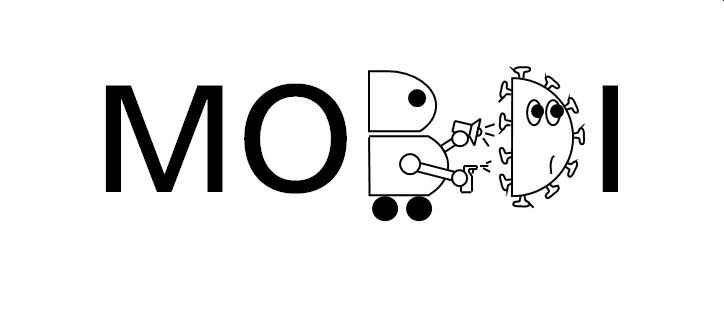Motivation
To cope with the Corona crisis and the expected "new normal", it is essential to minimize the risk of infection from infected persons. Contact infections caused by touching contaminated surfaces represent a relevant transmission route. Common practice is currently the wipe disinfection of these surfaces by cleaning personnel. However, reliable and documentable disinfection is often not possible. Cleaning agents or disinfectants are often applied in excess without feedback on the disinfection performance. In addition, surfaces are often damaged by the disinfectants or people are endangered by the resulting vapors.
In addition to disinfecting surfaces, the transmission of infection from one person to another can also be counteracted by spatial separation, e.g., by minimizing walking paths.
Project Description
The aim of the MobDi project is to develop new technical solutions for the efficient yet gentle mobile disinfection of surfaces and for the automated and hygienic transport of goods in buildings and for public transport. On the one hand, the project is concerned with the development of modular cleaning and transport robots that can be used flexibly for this purpose. On the other hand, key technologies in the field of robot perception are being developed and new methods for the analysis and - based on this - the targeted cleaning and disinfection of surfaces are being investigated. The benefits of the newly developed technologies will be validated with the aid of extensive practical evaluations.
In addition to the disinfection robots, a new transport robot is also to be developed for the use in clinics and care facilities. This will be characterized by a particularly small footprint and a highly maneuverable chassis. The hardware and software components developed in the project will be designed in such a modular way that they can also be transferred to other robots or used as stand-alone solutions.
Services
The robotic solutions designed in the project will only become established in practice if they are developed in line with the needs of the users and are also economically sustainable. Thus, an early anchoring of socio-economic research questions is essential for the success of the project. The Fraunhofer IMW is therefore responsible for a systematic market and requirements analysis.
In addition, the economists validate the developed solutions with end users and conduct economic feasibility analyses. In doing so, the research team builds on the experience gained from a number of robotics projects: In the "KuKoMo" project, the economic efficiency of collaborative assembly systems in SMEs was analyzed. In the "ASARob" project, which focused on the use of pilot, communication and activation robots in clinics and care facilities, the needs of potential users as well as ethical, legal and social (so-called ELSI) aspects raised by the project were researched.
Duration of Project
1.10.2020 - 30.9.2021
Client
Fraunhofer-Gesellschaft
Project Partners
Fraunhofer IPA, IOSB, IFAM, IST, FEP, IOF, IWS, IPM, ILT, IVV, Italia

